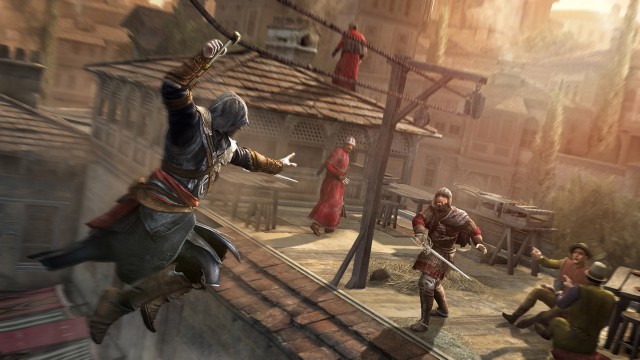Multiplayer improves, but does not perfect
Building off the unique multiplayer mode added in Brotherhood, Revelations also changes very little in the online portion of the game. It is now easier to stun your killer, resulting in a contested kill where you still die but cause a penalty for your murderer. These honorable deaths do make you feel like less of a victim, but there remains to be a very poor balance for experienced players. Even high-level veterans seem to average roughly one kill per death, since it’s so easy for anyone to locate their prey, and no one ever seems to be patient enough to play the game as it was intended.
However, there are a handful of new modes that I found to be much more fun and involving than the standard offerings. Especially for team-based players, the Artifact Assault and Chest Capture modes are excellent, allowing you to truly put the risk-versus-reward game play to the test. The new Corruption mode is also great fun and brings the sort of forward-thinking variety I wish I had seen in the rest of the game.
Lastly, in keeping with the tradition of justifying the multiplayer through story, players can now unlock cutscenes detailing the history of Abstergo as they level up. It’s a small thing, but it’s this extra work that differentiates Assassin’s Creed’s multiplayer from the kind of Dead Space-esque tacked-on dribble that all too many AAA games seem to subscribe to these days.
What now, then?
The writing and voice acting are as superb as ever, and the combat and in-game animations are excellent. Assassin’s Creed proudly wears its Prince of Persia heritage on its sleeve, and even with growing competition from the likes of Uncharted and inFamous, the freerunning here is still the best in the industry, a true testament to the powerful foundation the developers laid for themselves years ago.
But that’s not enough anymore. Revelations is the least-polished entry yet, suffering from a number of glitches that steal items when changing outfits or worse, render missions unbeatable, requiring that memory to be restarted. Revelations is also the most iterative entry in the entire series, rarely making any substantial changes to the aging formula and offering up mundane, meaningless filler in its place. Did Ubisoft run out of ideas, or was Revelations rushed out half-baked to make way for Assassin’s Creed III? With so many studios’ hands in the pot, it almost feels as if some sort of B team was assigned to Revelations, though the end result is not quite as tragic as when Treyarch helms Call of Duty, or Obsidian helms…well, anything.
Assassin’s Creed: Revelations is the end of two epic journeys and the beginning of another. Where exactly that tale will lead is still anyone’s guess, though I’d bet money on feudal Japan. It makes sense from a number of perspectives, and a producer at Ubisoft told me earlier this year that Japan is an internal favorite. But whatever the next game is, it needs to boldly go where no Assassin’s Creed has gone before, not just in terms of setting, but in all the ways that Revelations doesn’t. Otherwise, like any annual sports or rhythm music title, this series is dangerously close to wearing out its welcome. 80 out of 100
Assassin’s Creed: Revelations was released on November 15, 2011 for the Xbox 360 and PlayStation 3. This review is for the Xbox 360 version.
VentureBeat's mission is to be a digital town square for technical decision-makers to gain knowledge about transformative enterprise technology and transact. Learn More


